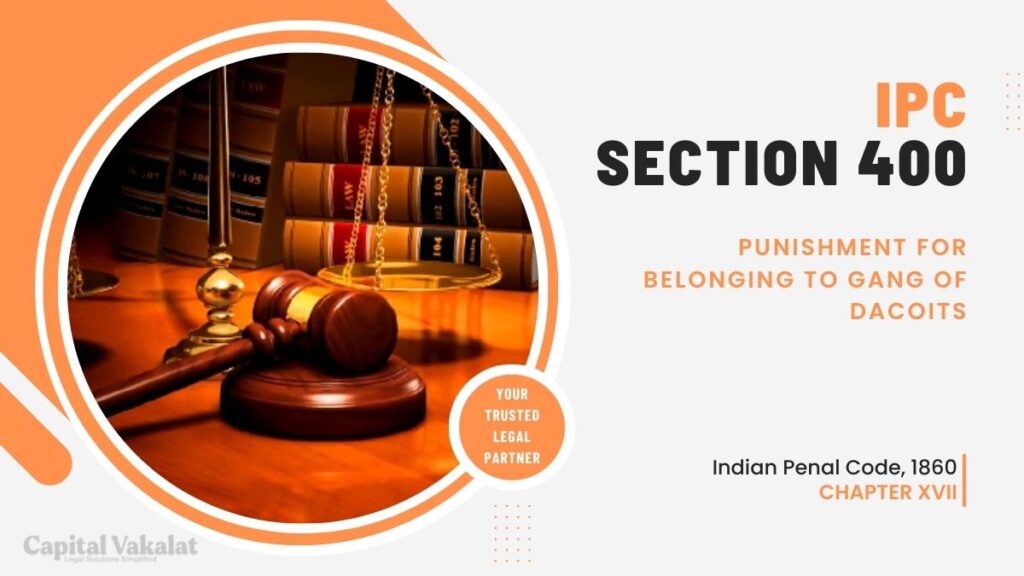Crime has always been a matter of concern for societies, prompting the establishment of laws to maintain order. In India, Section 400 of the Indian Penal Code (IPC) addresses the issue of belonging to a gang of dacoits, imposing severe penalties on those involved.

This article explores the intricacies of Section 400 IPC, its historical context, enforcement challenges, impact on organized crime, legal defenses, controversies, international comparisons, recent updates, and concludes with a summary of its significance.
Section 400 IPC is a pivotal legal provision aimed at combatting organized crime, specifically targeting individuals associated with gangs of dacoits. Dacoity, characterized by armed robbery by a group of people, has been a persistent problem in India, necessitating stringent legal measures. This section plays a crucial role in the deterrence and punishment of those involved in such criminal activities.
Historical Context
To understand the significance of Section 400 IPC, it’s essential to delve into its historical roots. The provision has its origins in the evolving legal landscape of India, adapting to the changing nature of criminal activities. Over the years, laws against organized crime have undergone substantial modifications to address new challenges and safeguard the interests of society.
Key Provisions of Section 400 IPC
Section 400 IPC outlines the legal framework for dealing with individuals belonging to gangs of dacoits. It defines the criteria for identifying such individuals and prescribes penalties for their involvement. The section is meticulous in its approach, ensuring that those found guilty face significant consequences, thereby serving as a deterrent for potential offenders.
Challenges in Enforcement
Despite the clarity in the legal language, enforcing Section 400 IPC poses various challenges for law enforcement agencies. The elusive nature of organized crime makes it difficult to gather evidence, leading to a lower conviction rate. High-profile cases often involve well-coordinated gangs, testing the efficacy of the legal provisions in place.
Impact on Organized Crime
The effectiveness of Section 400 IPC in curbing organized crime is evident through statistical data and case studies. The provision acts as a deterrent, discouraging individuals from participating in such criminal activities. Examining the impact on crime rates and the dismantling of notorious gangs showcases the positive outcomes of this legal measure.
Legal Defenses
Individuals accused under Section 400 IPC may explore various legal defenses to challenge the allegations. Understanding the possible arguments and examining landmark cases provides insights into the complexities of legal proceedings in such matters. It is crucial to recognize that the legal system allows for a fair defense, ensuring justice prevails.
Controversies Surrounding the Section
The severity of the punishment prescribed by Section 400 IPC has sparked debates and controversies. Critics argue that the stringent measures may infringe on individual rights, necessitating a balance between law enforcement and civil liberties. Public discourse on the appropriateness of these penalties adds a layer of complexity to the discussion.
International Perspective
Comparing Section 400 IPC with similar laws in other countries provides a broader perspective on addressing organized crime. Understanding collaborative efforts and best practices globally can contribute to the continuous improvement of India’s legal framework in combating transnational criminal activities.
Recent Amendments and Updates
In the dynamic landscape of law, staying current with amendments and updates is crucial. Any recent changes to Section 400 IPC or government initiatives to strengthen the fight against organized crime need to be examined for a comprehensive understanding of the legal landscape.
Conclusion
In conclusion, Section 400 IPC stands as a formidable legal tool against organized crime in India. Its historical context, enforcement challenges, impact on crime rates, legal defenses, controversies, international comparisons, and recent updates collectively emphasize its significance in maintaining law and order. As society evolves, so must our legal frameworks, ensuring a delicate balance between justice and individual rights.
Frequently Asked Questions
Are there any proposed changes to Section 400 IPC in the near future?
As of my last knowledge update in January 2022, there were no imminent changes. However, it’s essential to stay updated on legislative developments for the latest information.
How does Section 400 IPC contribute to the fight against transnational organized crime?
Section 400 IPC, in conjunction with international cooperation, plays a role in addressing cross-border criminal activities. Collaborative efforts enhance the effectiveness of combating organized crime globally.
What legal defenses can be used against accusations under Section 400 IPC?
Common defenses may include establishing a lack of active participation, challenging the evidence presented, or questioning the legality of the investigation. Consultation with a legal professional is crucial for tailored advice.
Is Section 400 IPC applicable only to dacoities, or does it cover other forms of organized crime?
Section 400 IPC specifically addresses gangs of dacoits. Other forms of organized crime may be dealt with under different sections of the Indian Penal Code or specialized legislation.